You put your heart and soul into crafting the perfect emails for your clients.
But how do you know if these emails garner the traction you intended?
Powerful email tracking software is your answer!
Keeping track of the actions taken by your email recipients can help improve your outreach strategy and boost your revenue. Email tracking tools work within your inboxes and let you stay informed about the performance of every email you send out.
However, you must remember your industry type, budget, specific business needs, and employee pain points when selecting such a tool. To simplify this process, we have listed the 20 best email tracking tools available on the market and compared their salient features, pricing, pros, and cons, to help you make an informed decision.
Let’s dive right into the comparative analysis of the best tools to keep your email campaigns on track!
In a Nutshell
- Email tracking refers to closely monitoring critical metrics related to your email campaigns. It lets you identify whether the email has been delivered to and opened by the recipient.
- These metrics include- email opens, link clicks, attachment downloads, bounces, unsubscribes, location, devices, etc.
- Email tracking data can help you improve the productivity and efficiency of your upcoming campaigns. It lets you identify the ideal time for following up with prospects and customers.
- In this blog, we list the 20 best email tracking tools that can provide powerful insights into email campaigns, helping optimize future performance.
- Compare the features of these top-rated solutions against your business objectives to find the most effective software.
What Is Email Tracking?
Email tracking refers to monitoring the engagement of your emails. It involves keeping a check on the number of opens and reads that your email campaigns get.
The number of daily emails is expected to grow from 333.2 billion in 2022 to 376.4 billion in 2025- implying that email marketing is here to stay for the coming time!
This is why you must invest in a tool that lets you stay updated with current performance and identify avenues for improving the effectiveness of future campaigns.
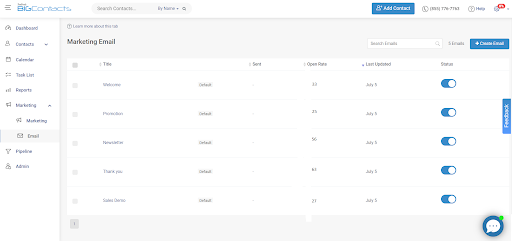
However, email tracking has now evolved into much more than just tracking email opens and click-throughs. Powerful email tracking can help you analyze your overall engagement strategy and identify areas of improvement by producing in-depth reports. Such a tool can also unify your email communication, helping you stay on top of every interaction.

To leverage the true potential of this tracking functionality, you need dynamic email analytics software with intelligent behavior tracking and sentiment analysis.
Email Tracking Tools- at a Glance
| Software | Key Features | Pricing |
|---|---|---|
| ✔️BIGContacts |
|
Forever free plan for up to 100 contacts. Paid starts at $9.99/user/month |
| ✔️HubSpot Email Tracking |
|
Starts from $45/month |
| ✔️Mailtrack.io |
|
Starts from $1/user/month |
| ✔️Yesware |
|
Starts from $15/user/month |
| ✔️Salesforce Pardot |
|
Starts from $1,250/month |
| ✔️Mixmax |
|
Starts from $9/user/month |
| ✔️SendBlaster |
|
Custom |
| ✔️Mailbutler |
|
Starts from $7.95/user/month |
| ✔️Snov.io |
|
Starts from $33/month |
| ✔️SalesHandy |
|
Starts from $7/user/month |
20 Best Email Analytics Tools
Let’s delve deeper into the comparison of the 20 best email tracking software that can offer valuable insights into email campaign performance.
1. BIGContacts
BIGContacts is a CRM solution that enables you to deliver targeted emails and track their performance. The tool centralizes your business communication by automatically capturing incoming emails and storing them against the respective contact record. It also offers read recipient notifications and powerful analytics that can be leveraged to improve the effectiveness of upcoming campaigns.
Key Features:
- Capture incoming emails from any program and store them in one place
- Choose from a range of pre-built reporting templates
- Generate custom reports with advanced filters to monitor essential email metrics
- Contact records are automatically updated with emails and attachments
- Access detailed conversation threads to track and manage emails
What You’ll Like:
- Access email tracking data on any mobile device
- Integrate BIGContacts with email capture tools such as Active Campaign, Emma, Mailchimp, Campaign Monitor, etc.
What You May Not Like:
- Emails with images load slowly
- Lacks advanced search options
Pricing:
- Forever free plan for up to 100 contacts.
- Paid starts at $9.99/user/month.
2. HubSpot Email Tracking
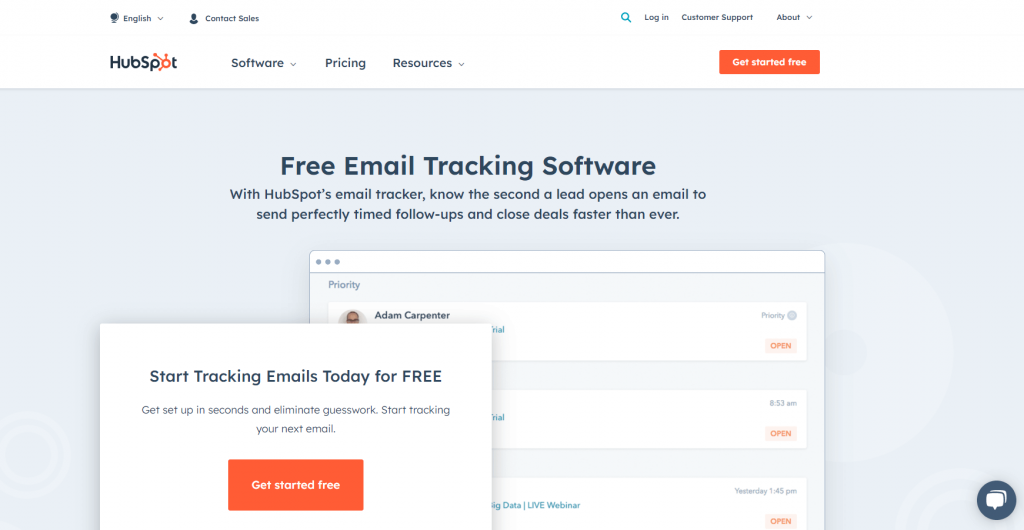
HubSpot email tracking software lets you follow up at the right time by letting you know as soon as the recipients open your emails or click on links within them. Along with providing real-time push notifications for email engagement, the tool automatically logs all emails into the respective contact records, making their interaction history easier to track.
Key Features:
- Track email opens, link clicks, and attachment downloads
- Connect the tracking software with Gmail and Outlook
- Set up desktop notifications for email tracking
- View when your emails were opened using detailed contact activity timelines
- Set up automated email sequences based on email activity
What You’ll Like:
- Get access to email performance in real-time
- Score leads based on email engagement to identify valuable prospects
What You May Not Like:
- Offers limited customization options
- Reporting falls short of expectations
Pricing:
- Free plan available
- Paid plans start from $45/month
3. Mailtrack.io
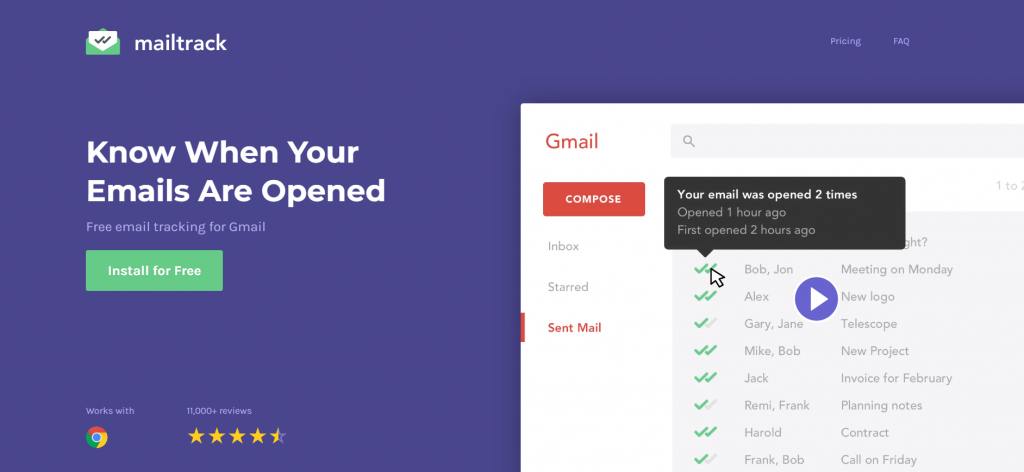
Mailtrack.io is a reliable email tracking solution offering seamless integration with Gmail. It allows you to track email sent and open rates accurately. This tracking data can be exported as CSV files. Mailtrack delivers real-time desktop notifications, making email tracking effortless. You can also set up link tracking and no-reply alerts using this application.
Key Features:
- Use the Chrome extension to keep track of your email engagement rates
- Set up alerts for when recipients click on links in your emails
- Access comprehensive dashboards and daily reports for your email tracking activity
- Get notified when recipients do not open or respond to your emails
- Create contact lists to deliver targeted emails
What You’ll Like:
- Get real-time notifications for email opens
- Deliver and track emails using your Gmail mobile app
What You May Not Like:
- Emails have a “Sender notified by Mailtrack” signature
- Challenging to track individual opens for group emails
Pricing:
- Free plan available
- Paid plans start from $1/user/month
4. Yesware
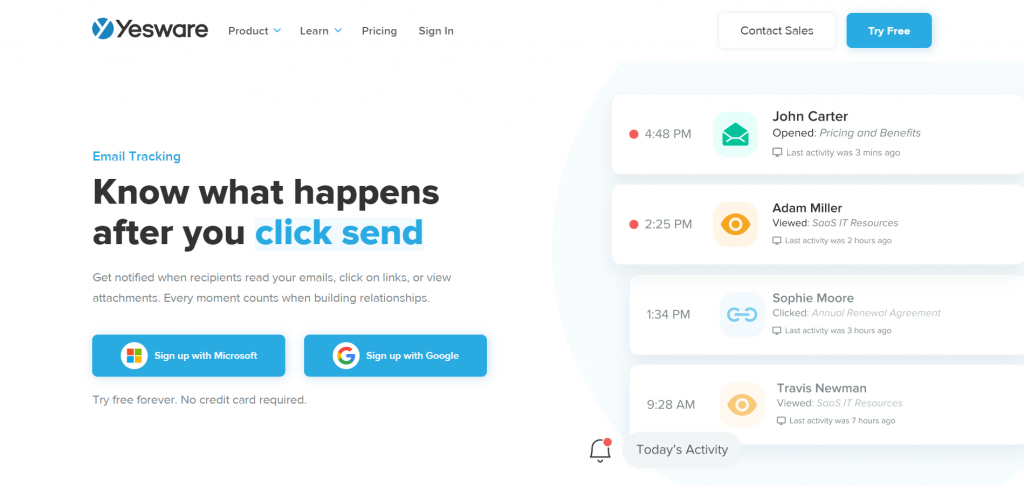
Yesware is a powerful solution for tracking email opens, link clicks, and attachment views in real-time. The tool lets you identify your most valuable prospects and follow up with them more effectively. It lets you track team members’ activity and view complete engagement history with clients from within your inbox.
Key Features:
- Set up instant notifications for email opens and link clicks
- Connect the application with your Outlook and Gmail inboxes
- Get daily reports to uncover valuable insights into your email campaigns
- Use dashboards to get a glance at your weekly performance
- Filter engagement data based on team members or campaign dates
What You’ll Like:
- Add tracked attachments to your emails
- Track customer engagement histories within your inbox
What You May Not Like:
- Does not always produce accurate results
- Cannot track individual opens for multiple recipients
Pricing:
- Free plan available
- Paid plans start from $15/user/month
5. Salesforce Pardot
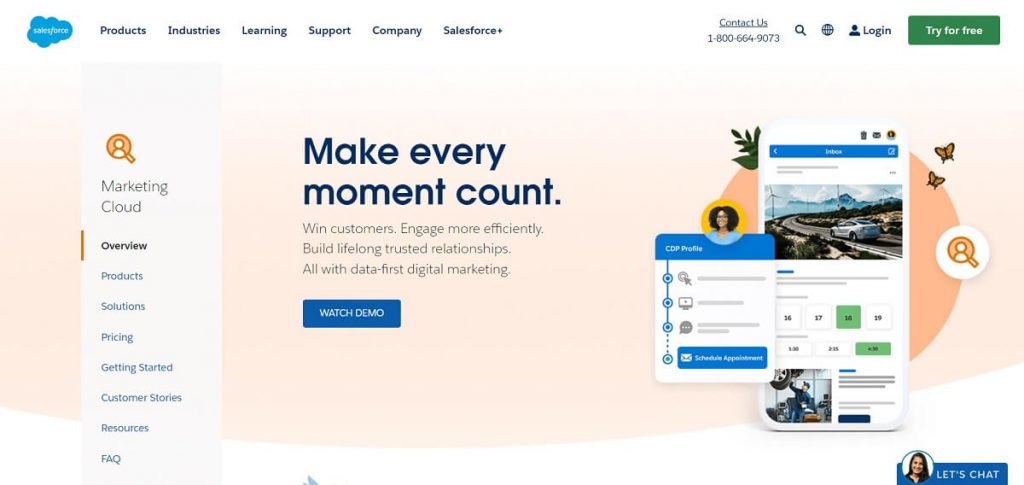
Salesforce marketing cloud platform unifies engagement data, helping you optimize future campaigns. The AI-powered insights into email campaigns offered by Salesforce can help you deliver the most relevant messages to your customers, which can translate into more conversions. The tool lets you craft the most effective emails by running quick iterations and utilizing this data to offer recommendations.
Key Features:
- Access a clean dashboard to stay updated with relevant metrics
- Get access to real-time reports to track email activity
- Leverage AI-powered insights to improve your email marketing campaigns
- Choose from a vast library of pre-built charts to visualize your tracking data
- Discover the best time and frequency to deliver emails to specific audiences
What You’ll Like:
- Automate reporting to eliminate busywork from your team’s workflow
- Use the Slack integration to share email tracking data with your team instantly
What You May Not Like:
- The interface is not intuitive and requires extensive training
- The lack of customization options can be frustrating
Pricing:
- Starts from $1,250/month
6. Mixmax
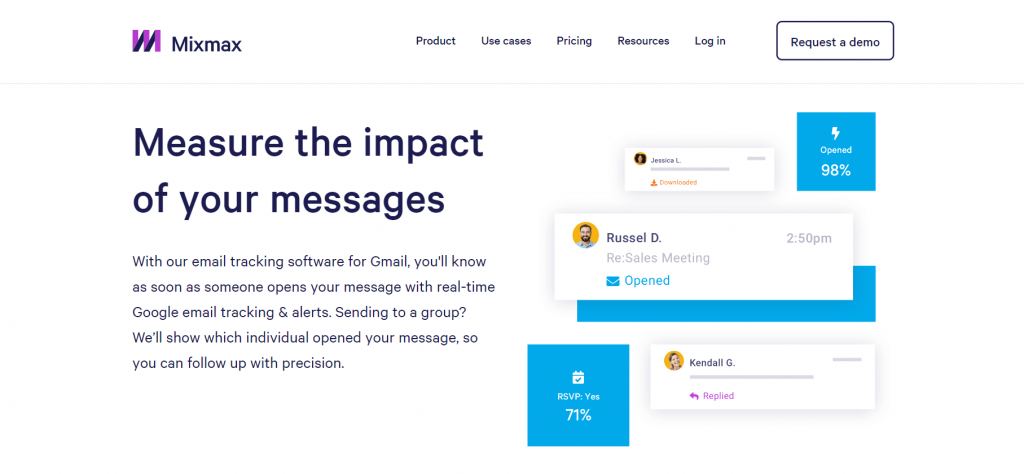
Mixmax is one of the best email trackers for Gmail that lets you stay updated with how recipients engage with every email that you send out. This can help you follow up more efficiently and help you drive better customer engagement. The tool’s sidebar provides easy access to customer data, allowing you to deliver more targeted email campaigns.
Key Features:
- Set up real-time alerts for email tracking
- Track individual opens and link clicks for group emails
- Use a sidebar to gain insights into your customers
- Create email engagement alerts delivered over email, text, or Slack
- Choose between individual team members, email campaigns, and global views for tracking email data
What You’ll Like:
- Track engagement for email attachments
- Gain better insights with integrations such as Salesforce, Pipedrive, Typeform, Dropbox, etc.
What You May Not Like:
- The interface is cluttered and hard to navigate
- Setting reminders is not user-friendly
Pricing:
- Free plan available
- Paid plans start from $9/user/month
7. SendBlaster
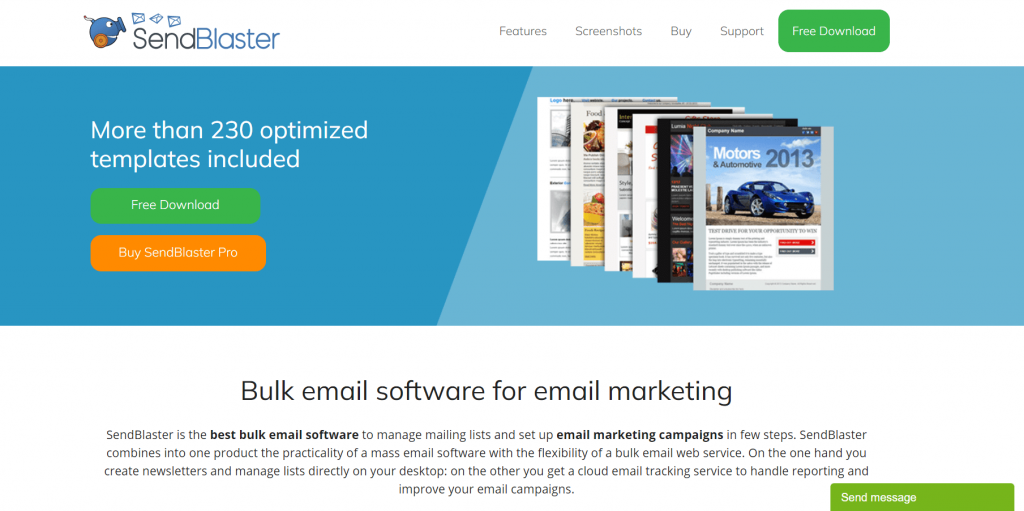
SendBlaster is a mass emailing software that lets you track how recipients engage with your emails. The tool offers seamless integration with Google Analytics, allowing you to keep track of email opens and reading times effortlessly. It helps you determine the actions prospects and customers take after they receive and engage with your emails.
Key Features:
- Use the Google Analytics integration for powerful email tracking and reporting
- Monitor the number and duration of your email reads
- Track customer actions such as subscribes or purchases post email opens
- Access comprehensive analytics dashboard to monitor email activity
- Automatically detect email bounces and remove the addresses from your mailing lists
What You’ll Like:
- Create segmented contact lists based on engagement data
- Schedule email delivery based on custom triggers, including email activity
What You May Not Like:
- The interface isn’t beginner-friendly
- Sending emails can take up a significant amount of time
Pricing:
- Custom pricing
8. Mailbutler
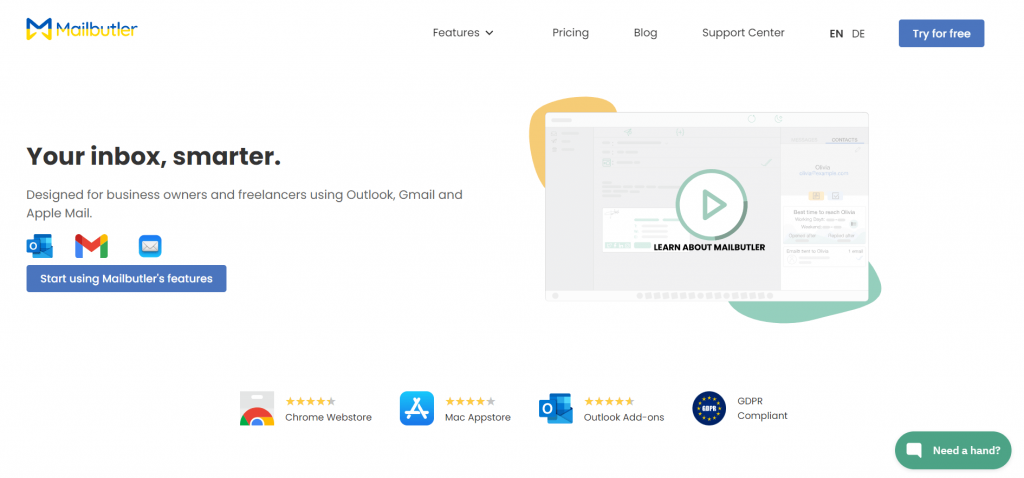
Mailbutler is a reliable email tracking solution for Outlook, Gmail, and Apple Mail. It lets you find out when your emails were opened by recipients and when they clicked on the included links. You can also track how often the emails were opened by particular recipients in bulk email campaigns using the tool’s per-recipient tracking feature for Apple Mail.
Key Features:
- Track when, where, and how often emails get opened
- Connect the email tracker with your Gmail, Outlook, and Apple Mail inboxes
- Get email insights and track read receipts without leaving your inbox
- Enable link tracking for your emails
- Receive real-time notifications on your desktop or mobile device
What You’ll Like:
- Compliant with Apple Mail Privacy Protection and GDPR
- Track individual opens and clicks for bulk emails using an iCloud or IMAP email account within Apple Mail
What You May Not Like:
- The iOS app needs improvement
- Tracking opens for multiple recipients is difficult
Pricing:
- Free plan available
- Paid plans start from $7.95/user/month
9. Snov.io
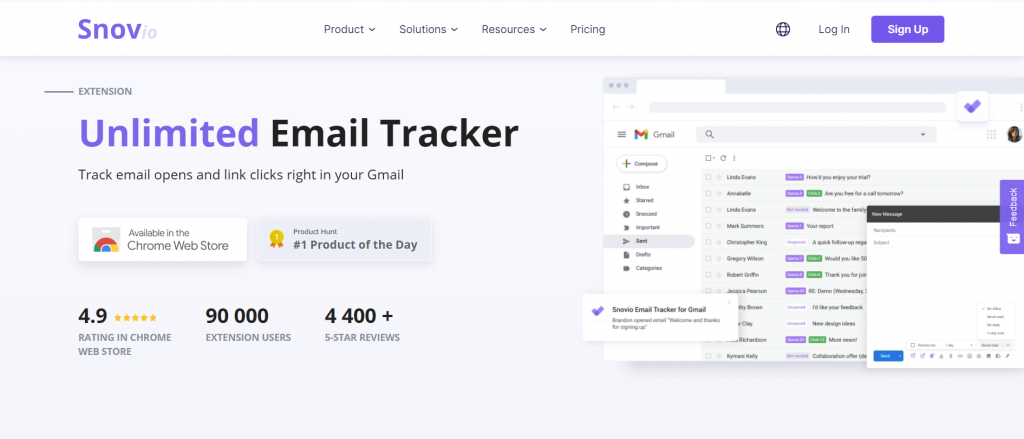
Snov.io offers email tracking service within your Gmail account. It allows you to optimize your outreach by identifying the emails that perform the best with your target audience. This email tracker can also be used to schedule emails so you can reach the customers at the most appropriate time based on their email preferences.
Key Features:
- Know when recipients open emails or click on links within them
- Get access to complete interaction histories for clients within Gmail
- Use the Chrome extension to turn email tracking on and off based on your needs
- Add and switch between multiple Gmail accounts easily
- Receive real-time push notifications on your desktop
What You’ll Like:
- Set follow-up reminders for opened or ignored emails
- Schedule emails to be delivered at the right time
What You May Not Like:
- Email deliverability rates are low
- Does not offer advanced search options
Pricing:
- Starts from $33/month
10. SalesHandy
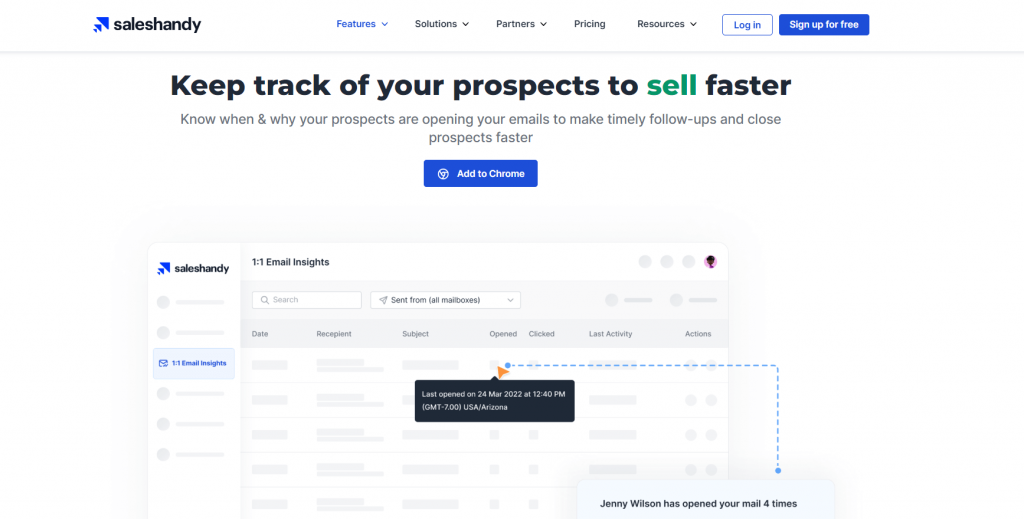
Saleshandy enables you to perfectly time your follow-ups by making it easier to track when a prospect engages with your emails. This can help close more deals and improve customer experiences. The tool also allows you to track the number of times recipients open your email or click on links within them.
Key Features:
- Monitor email opens and click-throughs within your Gmail account
- Receive real-time desktop notifications for email activity
- Connect the tool with multiple Gmail inboxes to streamline your email tracking
- Use the Chrome extension to track emails effortlessly
- Export detailed activity logs to keep track of your customer engagement
What You’ll Like:
- Track emails without letting the recipients know
- Integrate the tool with applications such as LinkedIn, Zoho CRM, HubSpot, and Freshsales
What You May Not Like:
- Customer support can be unsatisfactory
- Distinguishing individual opens for bulk emails is challenging
Pricing:
- Starts from $7/user/month
11. GetNotify
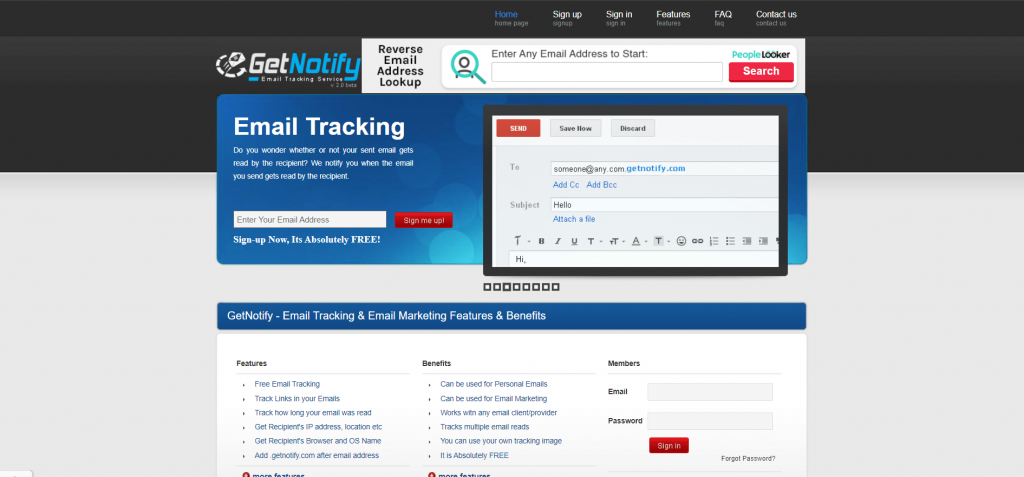
GetNotify is a free email tracking solution that lets you track whether your emails have been ready by the recipients. All you need to do is add .getnotify.com after their email addresses. The tool notifies you as soon as the email gets read, so you can take relevant action without delay.
Key Features:
- Receive instant notifications for email opens and reads
- Track the links opened by the recipients in your emails
- Get recipient details such as IP addresses, browser, OS, location, etc.
- Track multiple opens and the duration of each email read
- Use custom images as tracking images
What You’ll Like:
- Compatible with any email provider
- Do not let the recipient know that the emails are being tracked
What You May Not Like:
- You have to manually format email addresses to enable tracking
- Customer service response time is high
Pricing:
- Free
12. Intelliverse
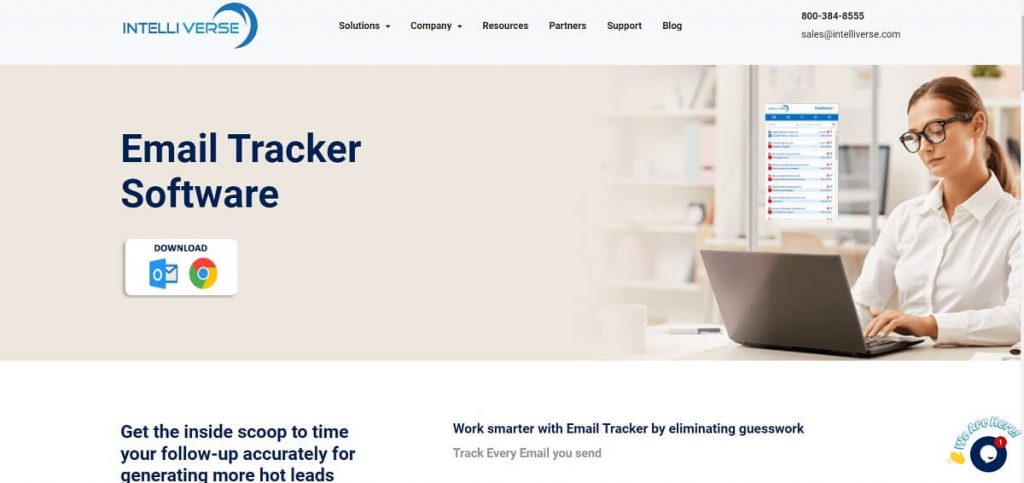
Intelliverse is an effortless way to track your emails sent from Outlook or Gmail. The tool enables you to contact prospects and customers at the most appropriate time by providing you access to tracking data in real-time. Moreover, with regular alerts about email delivery and engagement levels, you can optimize your upcoming interactions effectively.
Key Features:
- Get real-time notifications for email reads and link clicks
- Monitor the number, devices, and locations of email opens
- Track emails without letting the recipients know
- It offers a free plugin for Outlook and Chrome
- Access the email tracker right within your Gmail account
What You’ll Like:
- The tool does not have access to your email content
- Use the tool for tracking an unlimited number of emails
What You May Not Like:
- Does not integrate with browsers other than Google Chrome
- Lacks advanced reporting capabilities
Pricing:
- Free for a limited time period
13. LeadBoxer
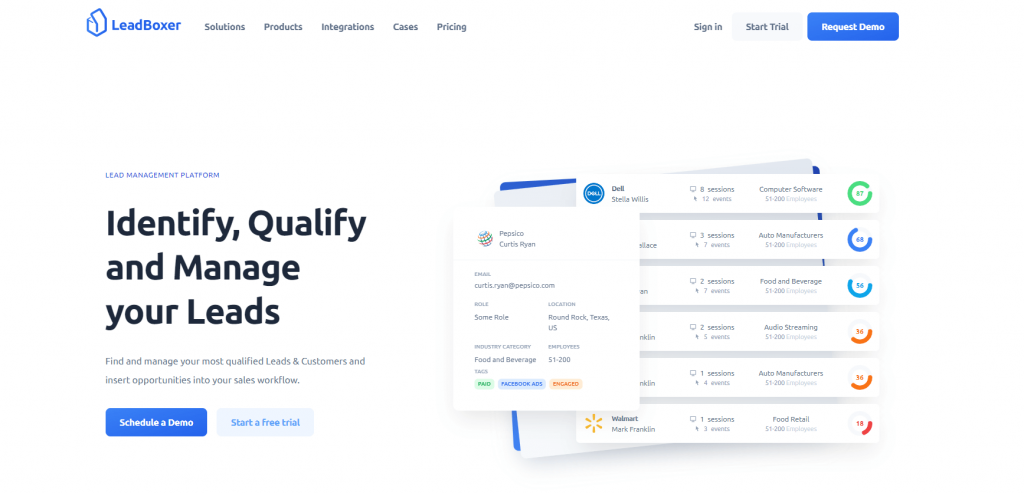
LeadBoxer lets you track email engagement rates and the website behavior of your prospects and customers. The platform offers powerful conversion insights, so you can repeat actions that help close sales quickly and efficiently. It also lets you target specific accounts for email tracking, allowing you to identify engagement opportunities for particular audience segments.
Key Features:
- Track email clicks, opens, and attachment downloads
- Create customizable reporting dashboards to track essential metrics
- Enable account-based tracking for emails
- View complete customer journeys following link clicks
- Get instant notifications to connect with qualified prospects at the right time
What You’ll Like:
- Track the website behavior of email recipients to optimize your campaigns
- View all past interactions related to your clients right from their first visit in one place
What You May Not Like:
- The dashboard’s interface is challenging to navigate
- Limited data enrichment and lead-scoring capabilities
Pricing:
- Starts from $195/month
14. Autoklose
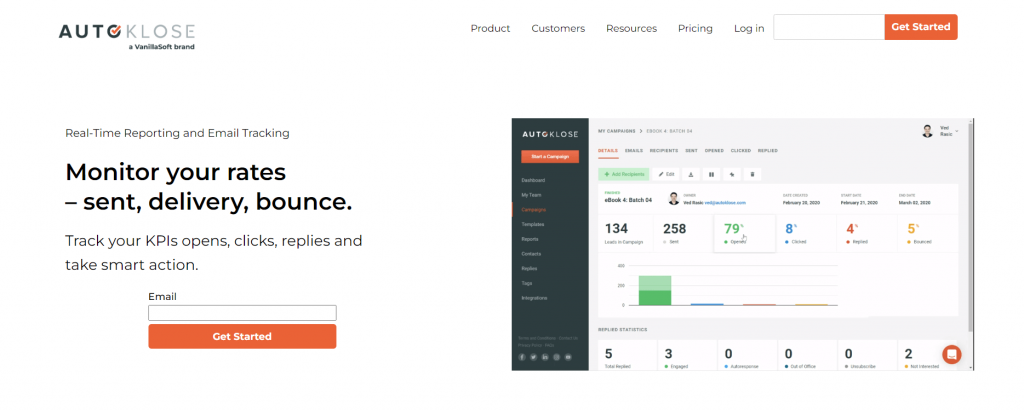
Autoklose lets you monitor your email delivery and bounce rates effortlessly. The tool helps predict customer behavior and track campaign metrics so you can optimize your emails. Autoklose allows you to analyze customer sentiment and filter email recipients. The tool can be connected to any email account, so you can track all conversations from a single platform.
Key Features:
- Track sent, delivery, opens, click-throughs, replies, and bounces for your emails
- Access comprehensive dashboards to track metrics such as most clicked links, hourly open rate, highest converting templates, etc.
- Filter reports by team members, dates, or current status
- Integrate with Gmail, Outlook, or any other email account via IMAP
- A/B test your email campaigns and utilize the data to improve your outreach
What You’ll Like:
- Pause or edit email campaigns based on email tracking data
- Download campaign reports as CSV files
What You May Not Like:
- Filtering and segmentation capabilities are limited
- There are daily and hourly limits on email delivery
Pricing:
- Starts from $49.99/user/month
15. Pointofmail
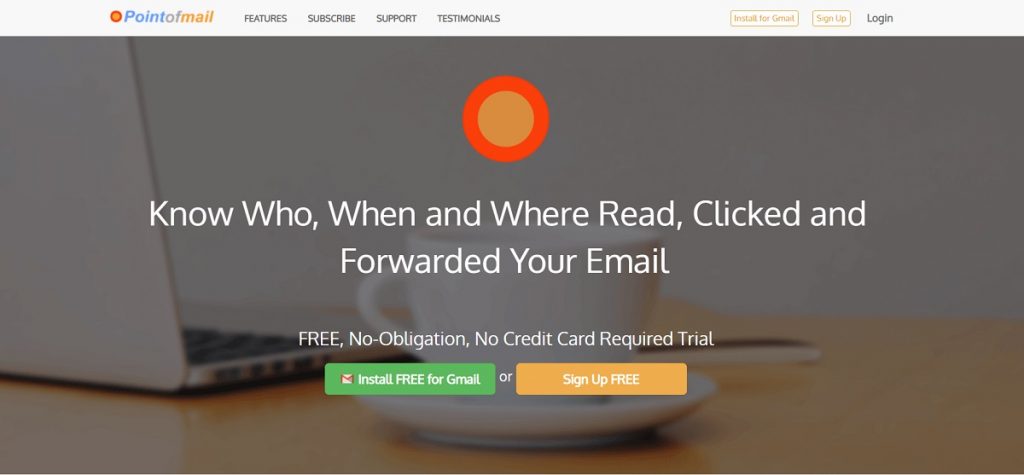
Pointofmail is an efficient solution for tracking and recalling emails, contributing to an improvement in the outcomes of your email campaigns. This email tracking program allows you to find out when, on what devices, and for how long your emails are read by the recipients. Moreover, you can identify who opened your emails when sending them out to multiple recipients.
Key Features:
- Track email opens, reads, clicks, forwards, and devices
- Get instant notifications for email activity on your desktop
- Enable link and attachment tracking for your email campaigns
- Search, sort, and group email tracking data
- Generate detailed graphs to track relevant KPIs and export this data as CSV files
What You’ll Like:
- Offers seamless integration with your Gmail and Outlook inboxes
- Access tracking data on the go with the mobile application
What You May Not Like:
- Customer support can be unresponsive at times
- Does not offer advanced customization options or pre-built templates for reports
Pricing:
- Starts from $13.99/month
16. OpenedOrNot
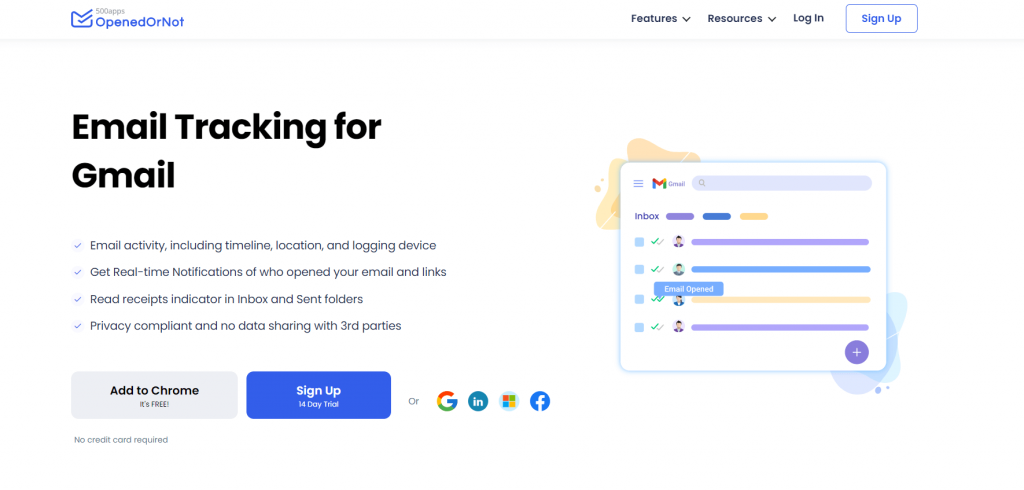
OpenedOrNot is a free email tracking solution for Gmail that provides you with real-time visibility into engagement data, ensuring that you stay informed at all times. The email analytics capabilities of this tool help you optimize your business outreach by providing insights into customer behavior and preferences. Use the Chrome extension of this tool to track emails better.
Key Features:
- Track timing, location, and devices using invisible email tracking pixels
- Perform A/B tests and measure their results to optimize campaigns
- Enable link tracking to find out the num ber of visits for links
- Get daily reports to keep track of your read and unread email count
- Recieve real-time notifications for email opens and link clicks
What You’ll Like:
- Access read receipts indicators within your Gmail inbox
- Set up automated reminders for following up at the right time
What You May Not Like:
- Requires more advanced filters for reports
- Limited integration options
Pricing:
- Free
17. Right Inbox
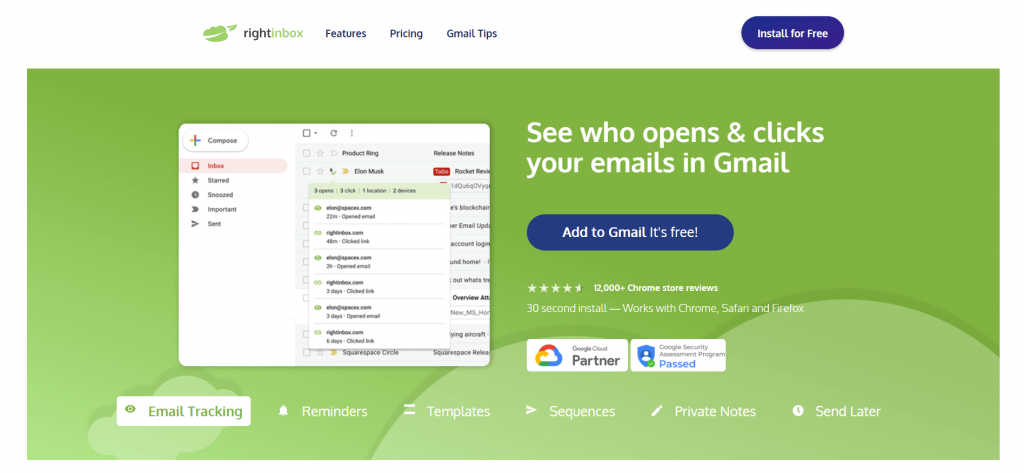
Right Inbox lets you track who opened your emails right within your Gmail account. It also makes it possible to identify link clicks and monitor email engagement with real-time updates. Moreover, you can use this email marketing tracking software to create automated email sequences and schedule their delivery based on when and how clients interact with your emails.
Key Features:
- Activate open and link tracking using one-click shortcuts before sending your emails out
- Track how many times your emails are read by recipients
- Get real-time updates for client engagement with your emails
- Set up automated follow-up sequences using email activity as triggers
- Identify your best-performing emails and save them as templates for future use
What You’ll Like:
- Install the extension to your Chrome, Safari, and Firefox browsers
- Add private notes to emails to store relevant details
What You May Not Like:
- Customer service is slow and inefficient
- The interface is clunky
Pricing:
- Free plan available
- Paid plans start from $5.95/month
18. MailTag.io
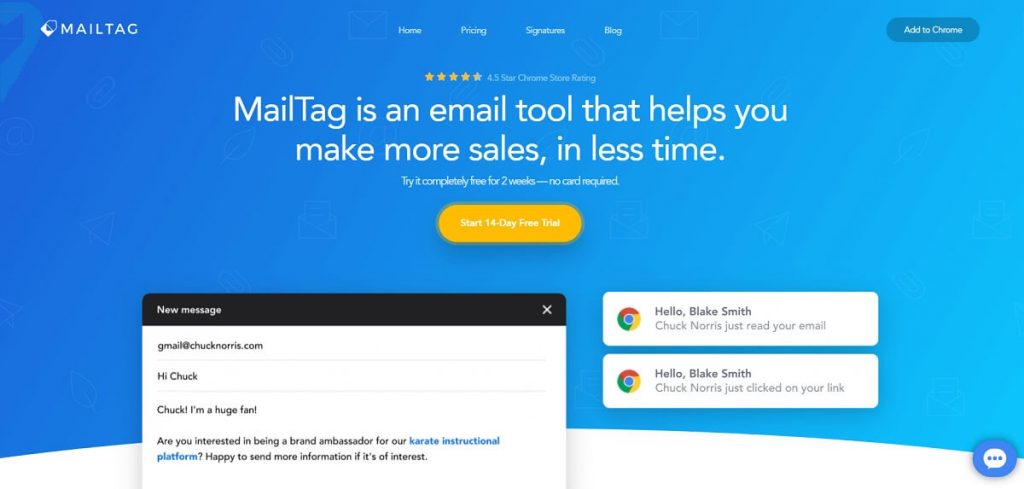
MailTag enables real-time email tracking to help you engage with prospects at the most appropriate time. It offers dashboards that let you track when, where, and how many times your emails were opened. You can also schedule emails and track their delivery performance using MailTag. The tool also allows you to track the productivity of team members.
Key Features:
- Access detailed dashboards and charts to monitor key campaign metrics
- Track link clicks within emails
- Set up desktop and email notifications for email tracking
- Available as a Chrome extension for effortless tracking of email metrics
- Monitor the performance of individual team members
What You’ll Like:
- Connect with your Gmail and GSuite accounts to analyze email performance from a single platform
- Use the mobile app to keep track of email activity on the go
What You May Not Like:
- Customer support is substandard
- Tracking for bulk emails is not up to par
Pricing:
- Starts from $9.99/user/month
19. Klenty
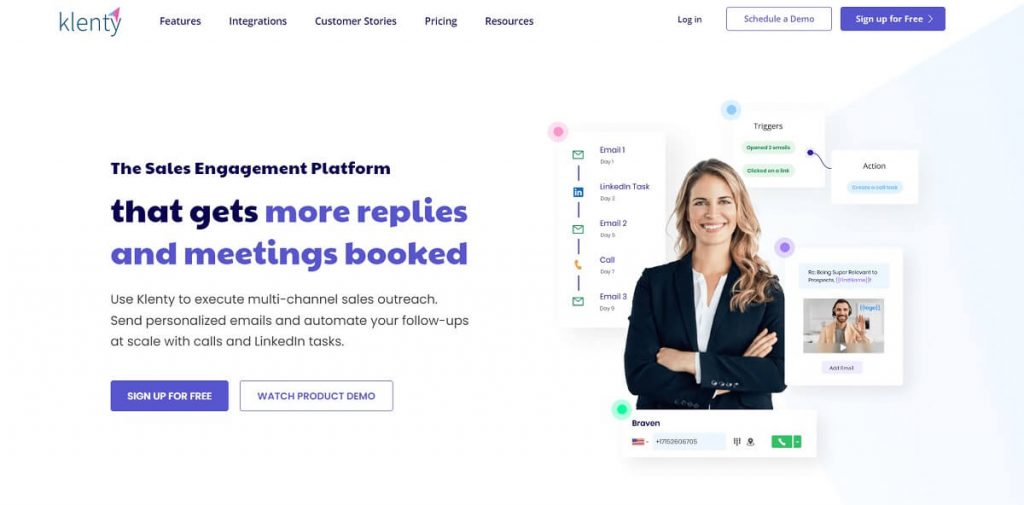
Klenty is a customer engagement tool that enables you to deliver multichannel outreach and track its performance in real-time. The tool offers data-driven insights into email campaigns, so you can optimize every interaction with prospects and customers. Klenty also lets you track your team’s performance and offer them adequate help to hit targets with ease.
Key Features:
- Track email opens, clicks, replies, bounces, and unsubscribes
- Monitor the performance of individual team members
- Set up email templates and track their performance
- Perform A/B tests to identify winning email attributes such as subject lines and CTAs
- Share the gathered insights with your team members effortlessly
What You’ll Like:
- Connect Klenty with Salesforce, Mailchimp, Google Sheets, Pipedrive, and other business applications
- Use email validation and domain tracking to ensure high deliverability of emails
What You May Not Like:
- The tool’s interface is not user-friendly
- Initial setup and training are time-intensive
Pricing:
- Starts from $35/user/month
20. Customer.io
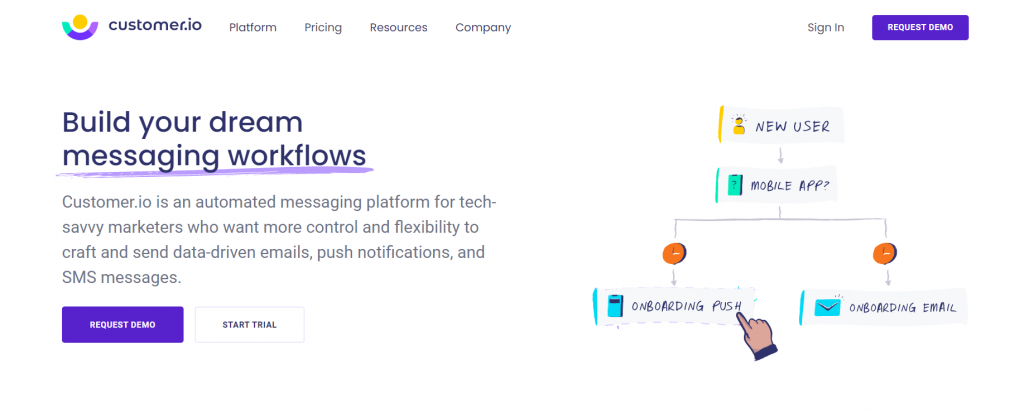
Customer.io lets you track, filter, and compare metrics to improve the effectiveness of your email campaigns. The tool enables real-time analysis of emails, enabling you to stay on top of your performance data at all times. It can also be utilized to test email components and flows, helping you make the most out of your outreach efforts.
Key Features:
- Monitor email delivery metrics using comprehensive dashboards
- Export email tracking data as CSV sheets
- Filter reports by attributes such as name, tags, channels, time range, etc.
- Track delivery, engagement, and conversion rates from the same platform
- Synchronize tracking data with your data warehouse, including Snowflake and BIGQuery
What You’ll Like:
- Run A/B tests and track their results using dashboards
- Connect the application with numerous business tools such as Asana, Zapier, Google Analytics, Hotjar, Calendly, Acuity, etc.
What You May Not Like:
- Customization options are limited
- The learning curve is steep
Pricing:
- Starts from $150/month
Facilitate Email Tracking With the Right Software
Take the guesswork out of your email performance by deploying a powerful tracking application.
In order to select the most appropriate solution out of the 20 best email tracking software mentioned above, you must consider your overall email marketing strategy.
For instance, if you need a comprehensive email management system that not only tracks your email open rates but also brings all communications to one platform, making this tracking and management easier, BIGContacts can prove to be a reliable choice.
Focus on the unique needs of your organization when making the selection. Do you require a tool that offers pre-set reports or one that lets you set up instant push notifications?
Identify specific features that are essential to your email tracking operations. This will help you find an optimal tool that yields growth in your bottom line.
FREE. All Features. FOREVER!
Try our Forever FREE account with all premium features!







